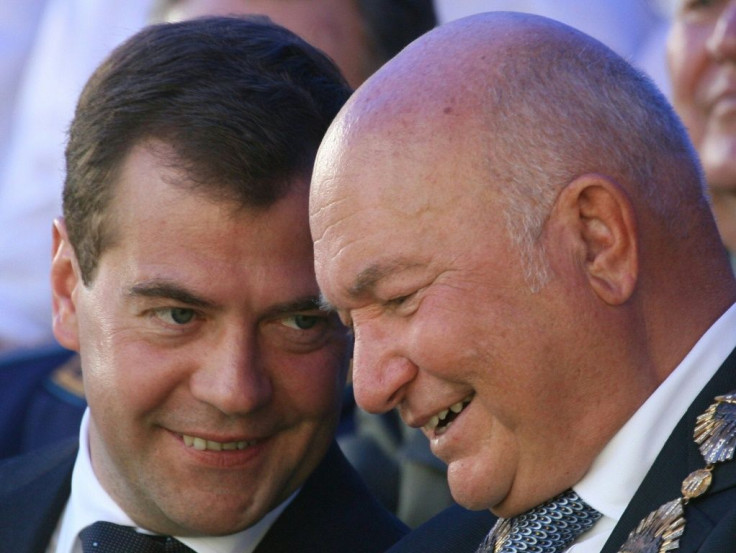Putin Leads Tributes As Ex-Moscow Mayor Yury Luzhkov Dies

Former Moscow mayor Yury Luzhkov, a political heavyweight who transformed Russia's capital but was dogged by corruption claims, has died aged 83.
Sergei Sobyanin, who succeeded Luzhkov nine years ago, announced his death on Tuesday, calling him a "life-loving person" who "did a lot for the city and for Muscovites" during his 18 years at the helm of the Russian capital.
Russia's REN TV channel said Luzhkov died in a Munich clinic after a heart surgery.
Luzhkov, who burnished his man-of-the-people credentials by sporting a flat cap and professing a passion for beekeeping, was one of the last in a generation of populists elected before President Vladimir Putin rose to power.
A major political figure during the 1990s, Luzhkov was a key ally of Russia's first president Boris Yeltsin until 1999 and was one of the founders of Russia's ruling United Russia party.
Tributes poured in from across Russia, with Putin praising Luzhkov as a "bright and brave politician".
"During difficult years, at the crossroads of history, he has done a lot for the development of Moscow, so that it could become one of the leaders of Russia's renaissance," Putin said.
He alluded to Luzhkov's support of Moscow's seizure of Crimea from Ukraine in 2014, adding that the former mayor repeatedly said Sevastopol was a Russian city.
Kremlin critic Mikhail Khodorkovsky said on Twitter that Luzhkov represented an "entire era" in the history of Moscow and Russia, recalling a time when Luzhkov was still "brave and honest".
Wildly popular in the 1990s, Luzhkov was seen as a possible future president but he shelved his ambitions after his Fatherland party was defeated in 1999 parliamentary elections.
He was appointed to the post of Moscow mayor by Yeltsin in 1992, inheriting a drab, chaotic city six months after the collapse of the Soviet Union.
He later won mayoral elections in 1996, 1999 and 2003 and helped to transform Moscow into a booming metropolis.
Once seemingly untouchable and boasting his own powerbase, Luzhkov's position became increasingly insecure as the Kremlin sought to freshen up the ranks of regional leaders.
He was fired by president Dmitry Medvedev in 2010 after a series of hastily compiled documentaries discrediting him aired on television.
Medvedev expressed his condolences through a spokesman.
Luzhkov's long stint as mayor saw the capital swell both in population and economic clout, but he was also associated with corruption owing to the success of his wife, Elena Baturina.
The 56-year-old rose from city hall employee to property magnate during their marriage and remains Russia's richest woman, according to Forbes.
Despite his jovial persona, Luzhkov authorised heavy handed tactics against grassroots protests and his openly homophobic comments and refusal to allow gay parades drew international criticism.
Many older Muscovites loved him for increasing their pensions but many other capital-dwellers hated his garish taste and his habit of destroying historic buildings.
In the 1990s, his friend sculptor Zurab Tsereteli dotted the city with kitsch bronze statues, including a giant Peter the Great looming over the Moscow River.
The pair's most grandiose project was the Church of Christ the Saviour, rebuilt after being blown up by the Bolsheviks in 1934.
Luzhkov was condemned by architectural conservationists for allowing the neglect and destruction of Moscow's historic buildings and their replacement with ersatz concrete replicas.
He was born in Moscow and joined the ministry of the chemical industry in 1974.
He was elected to the Moscow city council in 1977 and later served in parliament, known as the Supreme Soviet, from 1987 to 1990.
He is set to be buried at Moscow's prestigious Novodevichye cemetery.
© Copyright AFP 2024. All rights reserved.




















